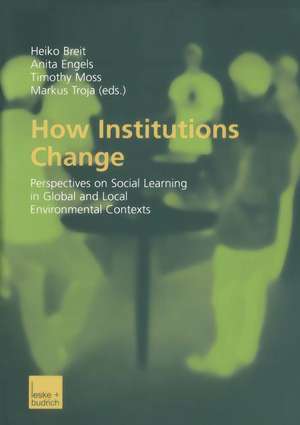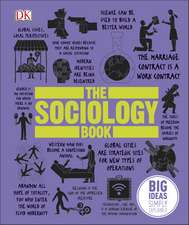How Institutions Change: Perspectives on Social Learning in Global and Local Environmental Contexts
Editat de Heiko Breit, Anita Engels, Timothy Moss, Markus Trojaen Limba Engleză Paperback – 31 aug 2003
Preț: 391.61 lei
Nou
Puncte Express: 587
Preț estimativ în valută:
74.93€ • 78.45$ • 62.00£
74.93€ • 78.45$ • 62.00£
Carte tipărită la comandă
Livrare economică 05-19 aprilie
Preluare comenzi: 021 569.72.76
Specificații
ISBN-13: 9783810038586
ISBN-10: 381003858X
Pagini: 384
Ilustrații: XI, 368 p.
Dimensiuni: 148 x 210 x 20 mm
Greutate: 0.5 kg
Ediția:Softcover reprint of the original 1st ed. 2003
Editura: VS Verlag für Sozialwissenschaften
Colecția VS Verlag für Sozialwissenschaften
Locul publicării:Wiesbaden, Germany
ISBN-10: 381003858X
Pagini: 384
Ilustrații: XI, 368 p.
Dimensiuni: 148 x 210 x 20 mm
Greutate: 0.5 kg
Ediția:Softcover reprint of the original 1st ed. 2003
Editura: VS Verlag für Sozialwissenschaften
Colecția VS Verlag für Sozialwissenschaften
Locul publicării:Wiesbaden, Germany
Public țintă
ResearchCuprins
Preface.- Foreword.- Institutional Change and Social Learning in Environmental Contexts: An Introduction.- I: Reshaping Institutions.- Of Course International Institutions Matter: But When and How?.- Learning in International Public Policy Networks. Managing Institutional Interplay between National and International Forest Programmes.- Solving Problems of ‘Fit’ at the Expense of Problems of ‘Interplay’? The Spatial Reorganisation of Water Management Following the EU Water Framework Directive.- Using Market Institutions for Sustainability: Environmental Production Standards in the Coffee Trade.- II: Linking Institutional Change to Social Practice.- Institutionalisation of Ecological Risk Perceptions: The Role of Climate Change Discourses in Germany.- Politics, Law and Citizens’ Responsibility. Justice Judgements in the Everday Reconstruction of Environmental Conflicts.- Institutional Dynamics of Changing Land Care Practices in the Central Namib Desert.- III: Institutionalising Social Learning.- Resolving Environmental Conflicts. Mediation and Negotiation as Institutional Capacities for Social Learning.- Myths and Laws: Changing Institutions of Indigenous Marine Resource Management in Central America.- Lessons Drawn from Burden Sharing Exercises. The EC Acidification and Climate Change Policies.- Social Learning at the Science-Policy Interface — A Comparison of the IPCC and the Scientific Assessments LRTAP Convention.- Conclusions.- Institutional Change in Environmental Contexts.- About the Authors.
Notă biografică
Dr. Heiko Breit, Deutsches Institut für internationale pädagogische Forschung, Frankfurt a.M., Germany; Dr. Anita Engels, Institut für Weltgesellschaft, Fakultät für Soziologie, Universität Bielefeld, Germany; Dr. Timothy Moss, Institut für Regionalentwicklung und Strukturplanung (IRS), Erkner, Germany; Dr.Markus Troja, MEDIATOR GmbH, Oldenburg, Germany.
Textul de pe ultima copertă
Das englischsprachige Buch untersucht die Frage nach institutionellem Wandel in lokalen und globalen umweltrelevanten Kontexten. How do institutions change? What can we learn about possibilities of and barriers to induced institutional changes? Where are potentials for more reflexive and more enduring processes of social learning? The book seeks to answer those questions.











